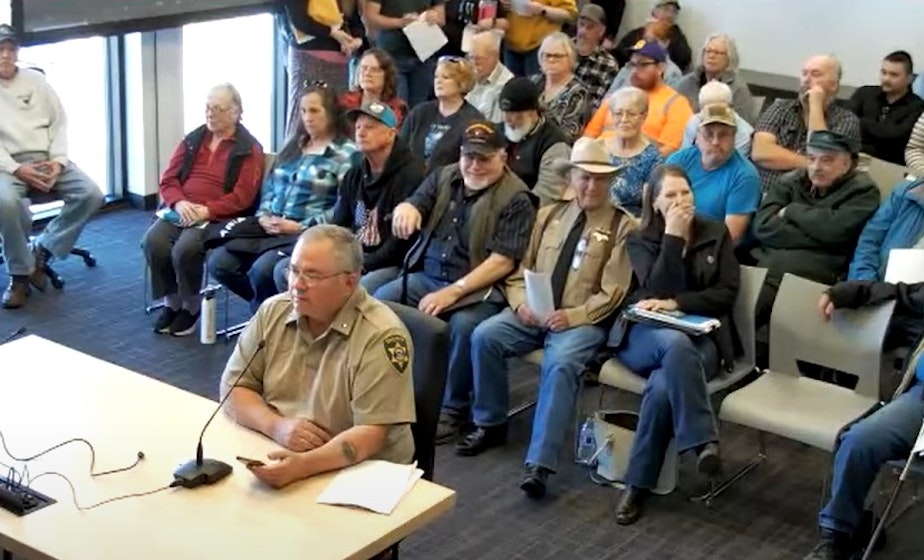Deaths at rural Washington jails highlight perilous conditions: 'Failures at almost every level,' critics say

Content warning: This story contains mentions of suicide.
In May 2023 in South-Central Washington, a 24-year-old man named Ivan Howtopat died by suicide while going through fentanyl withdrawal in Klickitat County Jail. His mother, Melissa Howtopat, said when Ivan Howtopat was arrested for violating his probation, multiple relatives told deputies he suffered from addiction and needed to be closely monitored. He was dead five days later.
“I think that if they would have taken me seriously and had a caring attitude about it, then they would have paid attention better and checked on him, and I would still have my son,” Melissa Howtopat said.
She said her son’s cell wasn’t captured on jail cameras, but cameras did record another cell nearby where a man appears to be coaching him.
“If they’re watching their cameras, they would have seen the guy that was in the same cell block as him was showing him how to hang himself,” she said.
Sponsored
Ivan Howtopat's death, in part, has led to calls for the jail's closure. Jail employees have packed public meetings and even helped current inmates phone in to defend the facility. The three-person county board seems divided. But the controversy reflects more widespread challenges for rural jails nationwide.
The Howtopat family has filed a $20 million tort claim, contending jail staff neglected to catch warning signs that Ivan Howtopat was a suicide risk.

“The failures happened at almost every single level of interaction with Ivan,” said attorney Corinne Sebren, who's representing the family. “From the moment they brought him in, they couldn’t do his booking intake because he wasn’t fully conscious.”
Another woman’s severe deterioration after months in the Klickitat County jail last fall has fueled more criticism. A police officer said the woman, Paulette George, smelled like “rotting flesh” by the time she was taken to the hospital. Jail staff say they struggled because the woman continually refused offers to eat, shower, or take medication.
Sponsored
Earlier this month, Klickitat County Commissioners voted 2 -1 in favor of a resolution stating their intent to close this jail in Goldendale, and to house inmates across state lines by contracting with Northern Oregon Regional Correctional Facilities instead.
“Let me be blunt: Our county faces a fiscal crisis, particularly in public safety costs,” Klickitat County Commissioner Jacob Anderson said.
He said the county faces rising deficits due to health care costs and does not have the resources for onsite medical staff at the jail that people in the community have called for.

Another commissioner, Dan Christopher, opposed the contract but said he’s open to changing jail leadership.
Sponsored
“I am in no way pushing aside or defending any potential malfeasance,” Christopher said. “We can’t fix the past; it’s how we address this issue and fix it going forward that we are deliberating.”
Jail management is currently provided by Klickitat County Sheriff Bob Songer, who has sparked controversy by calling himself a “constitutional sheriff” and refusing to enforce Covid mandates and voter-approved gun laws. Songer said he was blindsided by the proposal to close the jail and lay off 16 people.
“Let’s call it for what it is. It’s political. You know it and I know it,” he said at an April 2 county commissioners meeting.
Songer also defended his choice of failed Republican gubernatorial candidate Loren Culp to run the jail.
“I got news for you: As an elected sheriff I can appoint my managers,” he said. “And if you want to come after Loren Culp, you’re going to have a fight on your hands.”
Sponsored
The Washington Association of Sheriffs and Police Chiefs is currently seeking to expel Culp from membership for “numerous offensive social media posts.”
In recent public meetings, Culp pointed to multiple inmate suicides in state prisons to suggest the problems are not specific to his facility.
“With some of your thinking, shouldn’t we as citizens demand that we close state penitentiaries because of these record numbers of deaths?” he said.
Culp even brought in a current inmate, Steven Smith, on speaker phone during one meeting to tell commissioners that the jail staff “are courteous and kind. The stuff they have to put up with is really shocking to me.”
It’s not clear at this point whether county officials will still pursue the jail closure.
Sponsored
Melissa Howtopat said she wants to see a change in management at the very least. She said she doesn’t think her pleas for her son's care were taken seriously, adding that the jail debate is the latest chapter in strained relations between Native Americans and local law enforcement. Both Ivan Howtopat and George, the female inmate, are enrolled members of the Yakama Nation.
“Honestly it’s kind of par for the course for Native Americans in Klickitat County,” Melissa Howtopat said.
In addition to local deputies, Songer oversees an official volunteer “posse” which the county said is equivalent to neighborhood watch programs in urban areas. Posse members have also attended county meetings in support of retaining the jail.
Sebren, the attorney, said the county can’t use a lack of funding as an excuse for conditions that violate the civil rights of inmates. She said jails aren’t necessarily expected to treat addiction, “but withdrawal symptoms are highly treatable.”
“I do think that they have a duty to provide adequate medical and mental health care. So they do need to perform a very thorough and independent investigation,” she said.
Dr. Marc Stern, a correctional health care expert and University of Washington Public Health professor, said small jails are struggling. Inmates are coming in with more complex health needs, illicit drugs are more complicated to screen for, and “the bar has gone up” in the public’s expectations for care.
“It’s becoming, in my opinion, more and more difficult to have a small jail that is providing sufficient and safe health care. And I think one of the things that we seriously need to look at nationally is regionalizing our jails,” Stern said.
He compared it to the consolidation of high schools in rural areas. Klickitat’s potential contract with Northern Oregon Regional Correctional Facilities would be in line with that trend — and it wouldn’t be the first example of rural jail closure in Washington state.
A suicide in the Garfield County jail has prompted similar concerns in southeastern Washington. For now, Garfield is housing inmates in neighboring counties.
Galanda Broadman, the same law firm representing the Howtopat family, also filed a tort claim in Garfield County after the suicide of inmate Kyle Lara in 2022. Attorneys allege that it took jail staff more than 18 hours to detect Lara’s death. They say Lara blocked the view of video cameras before taking his own life, and staff continued to serve Lara multiple meals through a slot in his door.
Stern said it was “insightful” of the Garfield County Sheriff to determine that he couldn’t run such a small rural jail safely and economically. He added that preventing suicides in jails isn’t just a matter of initial screenings, because the condition of incarcerated people can change from day to day.
“I think we all agree that good training for frontline correctional officers — and a low threshold for them to seek help or seek attention for the patient when they think something is wrong — that’s probably the most important factor,” Stern said.
A proposal to create standards and independent oversight of the state’s jails failed in the Washington State Legislature this year but could be considered in future sessions.
If you or someone you know is experiencing a mental health crisis, call or text 988 for help. You can also contact the National Suicide Prevention Lifeline at 1-800-273-8255.




